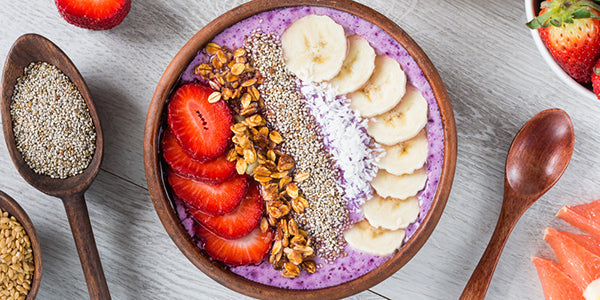
Benefits of a Plant-Based Diet
If you are looking to stay slim and trim, a plant based diet works well if you use it to reduce calories while ensuring you also consume enough protein. While "plant-based" does not mean a strict vegetarian, it does mean that the foundation of the diet rests upon foods that are grown in the ground, such as legumes, whole grains, fruits, vegetables, as well as nuts and seeds. Some plant-based diets also include fish and some lean meat as well, though this depend on the individual plan.
It's well-known in the scientific world that diets containing large amounts of fruits and vegetables can help people prevent a variety of chronic diseases. Extra fiber and potassium help stave off heart disease, and when whole foods displace refined carbohydrates it helps individuals steer clear of diabetes. The potent phytochemicals found in fruits and vegetables can help ward off cancer as well.
Plant-based diets also usually contain a variety of colorful foods, which are packed with a variety of nutrients aside from the well-known vitamins and minerals. For example, bell peppers have a variety of carotenoids that serve as antioxidants, and give those peppers their brilliant orange, red and yellow colors.
Plants also contribute powerful agents that serve as potent cell-protectors. For example, broccoli contains indole-3-carbinol - a potent molecule that has the ability to target and kill estrogen receptor alpha positive breast cancer cells.
Hypertension, also known as high blood pressure, can be greatly influenced by a plant-based diet. Research from the Harvard School of Public Health suggests that diets rich in fruits and veggies can actually work to significantly lower blood pressure. With high blood pressure comes increased risk of having a stroke or developing heart disease, both of which are the two leading causes of death in the US. Eating plenty of fruits and vegetables each day as part of a plant-based diet can have real benefits for lowering blood pressure, and preventing serious health events.
How many fruits and veggies will help keep your heart healthy? As it turns out, you need about 8 or more servings of fruits and vegetables each day to reduce the risk of a heart attack or stroke by 30%. This doesn't necessarily mean you have to eat 8 different fruits and vegetables, but adding additional servings of the ones you already eat can help.
Overall vegetarians seem to average fewer daily calories when compared to meat-eaters, which may help them maintain a healthy weight. Plant-based foods usually allow you to feel fuller on fewer calories, with the exception of olive, canola, and other plant-based oils. It's a good idea to opt for plant-based foods rich in fiber, such as beans, legumes, and fresh vegetables. Choose whole fruit instead of fruit juice can help as well.
Risks of a Plant-Based Diet
The two major risks associated with a plant-based diet are inadequate protein intake, and vitamin and mineral deficiencies.
If plant-based diets do not include foods such as fish, poultry, or low fat dairy products, then it can be challenging (though not impossible) to obtain the right amount of protein. When protein intake is low, the body will use up valuable protein stores in muscle tissue, where most of your calories are burned on a daily basis. Muscle losses can lead to decreased strength and mobility, especially in the elderly, making consuming enough protein on a daily basis of paramount importance.
Vitamin B12 deficiency poses a huge risk to plant-based dieters and the vegan population, because this particular vitamin is only available in animal foods, such as meat, poultry, eggs, and dairy products. Individuals following a vegan diet must take a B12 supplement in order to prevent deficiency over the long term. Some of the symptoms of vitamin B12 deficiency include anemia, fatigue, numbness and tingling in extremities, poor balance, and memory problems.
Plant-based diets are low in readily-absorbable iron. Often when individuals follow a vegetarian diet that does not include iron-fortified foods, iron deficiency can arise. There are compounds, such as oxalates and phytates, in plant foods that bind to calcium and other minerals, rendering them un-absorbable in the gastrointestinal tract. For example, spinach has plenty of calcium, but most of it is not bioavailable - meaning we cannot absorb it and use it in our body. This makes it a good idea to ensure that a plant based diet includes poultry or fish to provide a good source of bio-available iron.
Other risks of a plant-based diet include the possible development of other mineral deficiencies due to decreased absorption - such as zinc, copper, and selenium. These minerals have much better absorption from animal foods, and consuming only plant foods may put an individual at risk for deficiency.
Overall, it's a good idea to have a diet with a balance of intake from all of the food groups, including whole grains, legumes, nuts, seeds, fruits and vegetables, as well as low-fat dairy, poultry, and lean proteins. This allows for the best variety of nutrient intake each day, and ensures that you a getting the right balance of nutritious foods every day.





